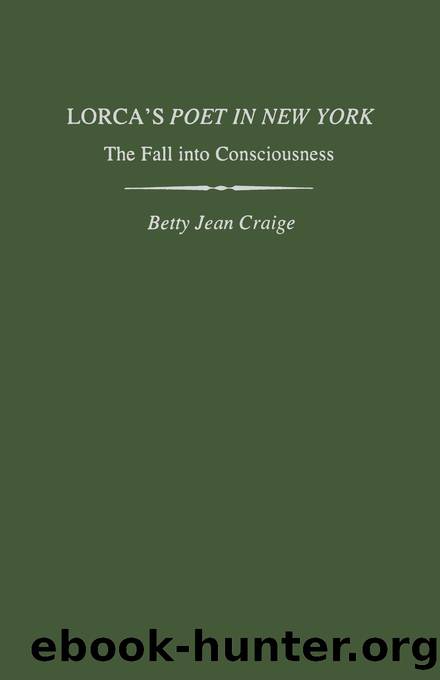Lorca's Poet in New York by Craige Betty Jean;

Author:Craige, Betty Jean; [Craige, Betty Jean]
Language: eng
Format: epub
Publisher: University Press of Kentucky
Published: 2021-08-15T00:00:00+00:00
Chapter Four
Poet in New York: The Vision
It is the blood that comes, that will come
over the sheds and rooftops, everywhere,
to burn the chlorophyll of the blond women,
to groan at the foot of the beds before the insomnia of the washbowls
and burst in a low yellow dawn of tobacco.
(p. 480)
âRitual,â says Northrop Frye, âseems to be something of a voluntary effort . . . to recapture a lost rapport with the natural cycle.â1 And it is ritual that has somehow been eliminated from the New York world Lorca sees which no longer even puts forth the âeffort . . . to recapture a lost rapport with the natural cycle,â to imitate the natural rhythms of the universe. As human vitality has vanished, so have real anguish, pain, and death disappeared from this unnatural world of âhollow men.â What is needed is a violent cataclysmic upheaval by which this civilization may confront the forces of life, destroy the cancer within, and begin again: death and resurrection. The cancer of materialism is eating away the vitality of the now dehumanized society of New York City, and it must be burned out before these people may once again know the forces of the blood and the moon, the wholeness of a community.
The movement from prophetic vision to action, from âspatial formâ to âtemporal formâ both within individual poems and through the volume as a whole, reflects a movement from the âepiphanic moment, the flash of instantaneous comprehension with no direct reference to time,â toward ritual.2 The action the poet calls for (after his vision) is a purgationâa symbolic deathânecessary to the accomplishment of a reestablished order and harmony with the cosmos; for the universe must expel the evil within in order to survive. In this cycle of tragedy the hero recognizes the necessity of death and fulfills his destiny, so that order may be reestablished.
At the heart of the tragic vision is the myth of the descentâinto night, winter, dissolution, death.3 Poet in New York, in its demonic imagery as well as in its tragic rhythm, may be seen as an enactment of the myth of the descent by which the destiny of the disintegrating community is violently fulfilled in a dramatic purgation of the evil forces of chaos that have threatened the poet with his own extinction.4 The myth of the descent into hell corresponds symbolically to the myth of the Fall, with the latter being a metaphor for the state of modern civilization which the poet sees here, and the former being a metaphor for the means by which this civilization may actively participate in its own destruction and effect its own salvation. In Christian terms, the âfortunate fallâ leads eventually to the necessary sacrifice of a god by which all mankind may be saved. Without the ritual sacrifice, there is no salvation.
The self-destructive cataclysmic upheaval which society must undergo for its salvation is made necessary by malignant forces at work within society that are silently bringing about the death of humanity.
Download
This site does not store any files on its server. We only index and link to content provided by other sites. Please contact the content providers to delete copyright contents if any and email us, we'll remove relevant links or contents immediately.
4 3 2 1: A Novel by Paul Auster(12375)
The handmaid's tale by Margaret Atwood(7757)
Giovanni's Room by James Baldwin(7326)
Asking the Right Questions: A Guide to Critical Thinking by M. Neil Browne & Stuart M. Keeley(5758)
Big Magic: Creative Living Beyond Fear by Elizabeth Gilbert(5754)
Ego Is the Enemy by Ryan Holiday(5413)
The Body: A Guide for Occupants by Bill Bryson(5080)
On Writing A Memoir of the Craft by Stephen King(4935)
Ken Follett - World without end by Ken Follett(4723)
Adulting by Kelly Williams Brown(4565)
Bluets by Maggie Nelson(4547)
Eat That Frog! by Brian Tracy(4525)
Guilty Pleasures by Laurell K Hamilton(4439)
The Poetry of Pablo Neruda by Pablo Neruda(4097)
Alive: The Story of the Andes Survivors by Piers Paul Read(4018)
White Noise - A Novel by Don DeLillo(4002)
Fingerprints of the Gods by Graham Hancock(3996)
The Book of Joy by Dalai Lama(3976)
The Bookshop by Penelope Fitzgerald(3844)
